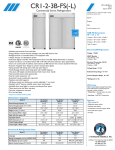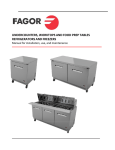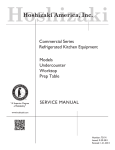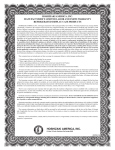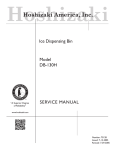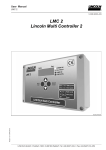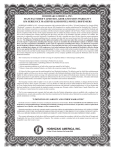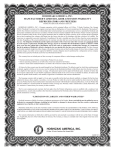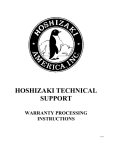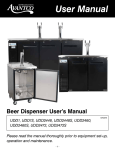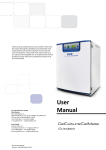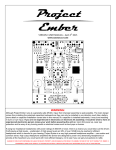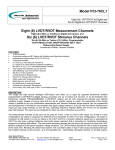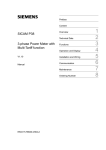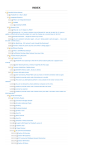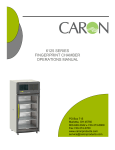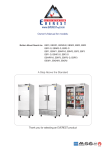Download HOSHIZAKI CRMR27
Transcript
CRMR27-LP Commercial Series Undercounter Refrigerator CRMR27-LP 1/15 Item #13328 Hoshizaki America, Inc. reserves the right to change specifications without notice. Item # Project: * Qty: *AutoCad available on KCL CRMR27-LP Dimensions W x D x H 1 Section - 27” x 30” x 32.3* *with 2.25” casters Electrical/Refrigeration • Stainless steel exterior front, sides and top • Anodized Aluminum interior sides and back with stainless steel interior floor • Meets ADA requirements • Stainless steel exterior door with ABS interior liner • Cabinet and door are insulated with 2” of CFC free, foamed in place polyurethane • Exclusive "stepped" door design to protect door gasket • Spring assisted self-closing door with stay open feature • Extruded aluminum flush mount door handle • Field reversible door • Magnetic door gasket is easily removable for cleaning • Enamel coated evaporator coil • Anodized aluminum shelf supports adjustable in ½” increments • Standard with 2.25" stem casters (two with brakes) • Three years parts and labor warranty • Five year compressor warranty • 8 ft. cord and plug * CRMR27-LP is ENERGY STAR qualified Dimensions / Capacity Model # Nominal Storage Capacity (CF) One Section CRMR27-LP 7.2 ft3 Adjustable Shelves Shelf Dimensions (W x D) Crated Shipping Weight Crated Height x Width x Depth 1 22.0” x 16.0” 160 lbs 36.5” x 31.5” x 34” Interior Storage Capacity (CF) (AHAM) Overall Width x Depth Height (including 2.25” casters) Door Opening Width x Height Depth with Door open at 90° Electrical / Refrigeration Data Model # Amperage Energy Consumption (kwh/day) ENERGY STAR Heat Rejection (BTU/Hr.) @NSF Approx. Nominal Compres. BTU/HR(HP) Voltage 115/60/1 HACR Breaker 15.0 . Electrical Connection (NEMA) 5-15P Voltage Range 104-126 Ambient Temp. Range 45˚-100˚F Temperature Range 32˚ to 52˚F *Refrigerant R-134a Warranty Valid in United States, Canada, Puerto Rico, and U.S. Territories. Contact factory for warranty in other countries. • Three Year - Parts & Labor on entire machine. • Five Year - Parts on: Compressor. Options • Additional epoxy shelves • Cylinder locks -01 (factory installed) 6.22 ft3 27” x 30” 32.3” 22.6” x 22.9” 54.5” One Section CRMR27-LP 2.6 .65 180 1029(1/6HP) © HOSHIZAKI AMERICA, INC. 618 Hwy. 74 S., Peachtree City, GA 30269 TEL 800-438-6087 FAX 800-345-1325 www.hoshizaki.com CRMR27-LP Commercial Series Undercounter Refrigerator 22.75” CRMR27-LP FRONT VIEW 32.3” 27” 2.25” 54.5” 30” 16” 14.75” 1” CRMR27-LP PLAN VIEW 9.64” CRMR27-LP SIDE VIEW (Cross Section) Cabinet Construction The exterior cabinet top, front, and sides, are constructed of high quality stainless steel. The exterior back and bottom are constructed of coated steel. The cabinet interior back and sides are anodized aluminum with an ABS ceiling and stainless steel floor. One heavy duty epoxy coated shelf per section is standard. Mounted on anodized aluminum pilasters the shelf is adjustable in ½” increments. Cabinet walls and doors are insulated with 2” of environmentally friendly, CFC free, foamed in place polyurethane. 2.25” polyolefin, stem casters (two with brakes) are standard. Door Construction Door is constructed of high grade stainless steel exterior with an ABS interior liner. Hoshizaki’s exclusive “stepped” design protects the gasket while product is removed from the cabinet. Door is provided with a one piece, extruded aluminum, flush mount handle. Spring assisted self-closing door is equipped with a stay open feature past 90 degrees. Snap-in magnetic door gasket is durable and easily removed for cleaning. Field reversible door hinging is standard. Refrigeration System The high efficiency refrigeration system is self-contained with an enamel coated evaporator for extended life. Condensate removal is accomplished with an energy efficient non-electric evaporation system. A capillary tube controls the flow of environmentally friendly R-134A refrigerant through the evaporator. Refrigeration system utilizes an “off cycle” defrost to eliminate any ice on the evaporator coil. 115 volt units are equipped with an eight foot cord and plug (20.0 amps or less). © HOSHIZAKI AMERICA, INC. 618 Hwy. 74 S., Peachtree City, GA 30269 • TEL 800-438-6087 • FAX 800-345-1325 • www.hoshizaki.com Hoshizaki Hoshizaki America, Inc. Commercial Series Refrigerated Kitchen Equipment Models Undercounter Worktop Prep Table “A Superior Degree of Reliability” INSTRUCTION MANUAL www.hoshizaki.com Issued: 12-2-2013 WARNING Only qualified service technicians should install and service the appliance. To obtain the name and phone number of your local Hoshizaki Certified Service Representative, visit www.hoshizaki.com. No installation or service should be undertaken until the technician has thoroughly read this Instruction Manual. Likewise, the owner/manager should not proceed to operate the appliance until the installer has instructed them on its proper operation. Failure to install, operate, and maintain the appliance in accordance with this manual may adversely affect safety, performance, component life, and warranty coverage. Proper installation is the responsibility of the installer. Product failure or property damage due to improper installation is not covered under warranty. Hoshizaki provides this manual primarily to assist qualified service technicians in the installation, maintenance, and service of the appliance. Should the reader have any questions or concerns which have not been satisfactorily addressed, please call, send an e-mail message, or write to the Hoshizaki Technical Support Department for assistance. Phone: 1-800-233-1940; (770) 487-2331 Fax: 1-800-843-1056; (770) 487-3360 E-mail: [email protected] HOSHIZAKI AMERICA, INC. 618 Highway 74 South Peachtree City, GA 30269 Attn: Hoshizaki Technical Support Department Web Site: www.hoshizaki.com NOTE: To expedite assistance, all correspondence/communication MUST include the following information: • Model Number • Serial Number • Complete and detailed explanation of the problem. 2 IMPORTANT This manual should be read carefully before the appliance is installed and operated. Read the warnings and guidelines contained in this manual carefully as they provide essential information for the continued safe use and maintenance of the appliance. Retain this manual for any further reference that may be necessary. CONTENTS Important Safety Information.................................................................................................. 4 I. Installation Instructions........................................................................................................ 7 A. Location......................................................................................................................... 7 B. Checks Before Installation.............................................................................................. 8 C. Setup.............................................................................................................................. 8 D. Door Reversal.............................................................................................................. 14 E. Electrical Connection................................................................................................... 17 F. Final Checklist............................................................................................................... 18 II. Operating Instructions....................................................................................................... 19 A. Important Notes About Usage...................................................................................... 19 B. Startup......................................................................................................................... 21 C. Controls and Adjustments............................................................................................ 21 1. Temperature Reading.............................................................................................. 21 2. Adjusting the Temperature...................................................................................... 21 D. Defrost.......................................................................................................................... 22 1. Undercounter and Worktop Refrigerators................................................................ 22 2. Prep Table Refrigerators and Undercounter and Worktop Freezers........................ 22 E. Food Storage............................................................................................................... 23 F. Safety Devices.............................................................................................................. 23 G. Cooling Performance................................................................................................... 24 H. Cabinet Condensation................................................................................................. 24 III. Cleaning and Maintenance Instructions........................................................................... 25 A. Cleaning....................................................................................................................... 25 1. Exterior.................................................................................................................... 25 2. Cabinet Interior....................................................................................................... 25 3. Door/Drawer Gaskets............................................................................................. 25 4. Shelves................................................................................................................... 25 5. Drawers.................................................................................................................. 26 6. Worktop (Worktop Models)..................................................................................... 26 7. Cutting Board (Prep Table Models).......................................................................... 26 8. Rail, Rail Hood, and Rail Cover (Prep Table Models)............................................. 26 B. Maintenance................................................................................................................. 27 1. Condenser............................................................................................................... 27 2. Power Supply Connection....................................................................................... 27 IV. Preparing the Appliance for Periods of Non-Use............................................................. 28 V. Disposal............................................................................................................................ 29 3 Important Safety Information Throughout this manual, notices appear to bring your attention to situations which could result in death, serious injury, damage to the appliance, or damage to property. WARNING Indicates a hazardous situation which could result in death or serious injury. NOTICE Indicates a situation which could result in damage to the appliance or property. IMPORTANT Indicates important information about the use and care of the appliance. WARNING The appliance should be destined only to the use for which it has been expressly conceived. Any other use should be considered improper and therefore dangerous. The manufacturer cannot be held responsible for injury or damage resulting from improper, incorrect, and unreasonable use. Failure to install, operate, and maintain the appliance in accordance with this manual will adversely affect safety, performance, component life, and warranty coverage. To reduce the risk of death, electric shock, serious injury, or fire, follow basic precautions including the following: • Only qualified service technicians should install and service the appliance. • The appliance must be installed in accordance with applicable national, state, and local codes and regulations. • To reduce the risk of electric shock, do not touch the plug with damp hands. • Unplug the appliance before servicing. • The appliance requires an independent power supply of proper capacity. See the nameplate for electrical specifications. Failure to use an independent power supply of proper capacity can result in a tripped breaker, blown fuse, damage to existing wiring, or component failure. This could lead to heat generation or fire. • THE APPLIANCE MUST BE GROUNDED. The appliance is equipped with a NEMA 5-15 three‑prong grounding plug to reduce the risk of potential shock hazards. It must be plugged into a properly grounded, independent 3-prong wall outlet. If the outlet is a 2-prong outlet, it is your personal responsibility to have a qualified electrician replace it with a properly grounded, independent 3-prong wall outlet. Do not remove the ground prong from the power cord and do not use an adapter plug. Failure to follow these instructions may result in death, electric shock, or fire. • Do not use an extension cord. • Do not use an appliance with a damaged power cord. The power cord should not be altered, jerked, bundled, weighed down, pinched, or tangled. Such actions could result in electric shock or fire. To unplug the appliance, be sure to pull the plug, not the cord, and do not jerk the cord. 4 WARNING, continued • The GREEN ground wire in the factory-installed power cord is connected to the appliance. If it becomes necessary to remove or replace the power cord, be sure to connect the power cord's ground wire. • Do not splash, pour, or spray water directly onto or into the appliance. This might cause short circuit, electric shock, corrosion, or failure. • Do not make any alterations to the appliance. Alterations could result in electric shock, injury, fire, or damage to the appliance. • The appliance is not intended for use by persons (including children) with reduced physical, sensory, or mental capabilities, or lack of experience and knowledge, unless they have been given supervision or instruction concerning use of the appliance by a person responsible for their safety. • Children should be properly supervised around the appliance. • Do not climb, stand, or hang on the appliance or doors/drawers or allow children or animals to do so. Do not climb into the appliance or allow children or animals to do so. Death or serious injury could occur or the appliance could be damaged. • Be careful not to pinch fingers when opening and closing the doors/drawers or rail cover (prep table models) or when handling food pans. Be careful when opening and closing the doors/drawers or rail cover when children are in the area. • Open and close the doors/drawers and rail cover (prep table models) with care. Opening the doors/drawers or rail cover too quickly or forcefully may cause injury or damage to the appliance or surrounding equipment. • Do not use combustible spray or place volatile or flammable substances in or near the appliance. They might catch fire. • Keep the area around the appliance clean. Dirt, dust, or insects in the appliance could cause harm to individuals or damage to the equipment. • Do not throw anything onto the shelves or load any single shelf with more than 120 lb. (54.5 kg) of product. They might fall off and cause injury. • Do not load any single drawer with more than 75 lb. (34 kg) of product. Depending on the weight of product in the drawers, secure the unit as necessary to prevent it from overturning. Do not open more than one drawer at a time. • The appliance is designed only for temporary storage of food. Employ sanitary methods. Use for any other purposes (for example, storage of chemicals or medical supplies such as vaccine and serum) could cause deterioration of stored items. • Do not block air inlets or outlets, otherwise cooling performance may be reduced. • Do not tightly pack the cabinet. Allow some space between items to ensure good air flow. Also allow space between items and interior surfaces. • Do not put warm or hot foods in the cabinet. Let them cool first, or they will raise the cabinet temperature and could deteriorate other foods in the cabinet or overload the appliance. 5 WARNING, continued • All foods should be wrapped in plastic film or stored in sealed containers. Otherwise foods may dry up, pass their smells onto other foods, cause frost to develop, result in poor appliance performance, or increase the likelihood of cross‑contamination. Certain dressings and food ingredients, if not stored in sealed containers, may accelerate corrosion of the evaporator, resulting in failure. • Do not store items near air outlets. Otherwise, items may freeze up and crack or break causing a risk of injury or contamination of other food. Additional Warnings for Prep Table Models • The entire rail must always be covered by rail dividers and pans (1/6 size, up to 6" (15 cm) deep). Otherwise, the appliance will not cool properly. • Use only 1/6 size pans up to 6" (15 cm) deep. Do not use damaged pans. • Ingredients must be pre-chilled to 37°F (3°C) or less before placing in rail. • Keep the rail cover closed when not actively preparing food. • The rail is for keeping ingredients cool while preparing food. If not actively preparing food for a long period such as overnight, seal pans with plastic wrap in addition to closing the rail cover. Depending on conditions, the cabinet temperature setting may need to be adjusted to prevent items from freezing. Alternatively, seal ingredients and store them in a refrigerator or freezer. NOTICE • Protect the floor when moving the appliance to prevent damage to the floor. • Keep ventilation openings, in the appliance enclosure or in the built-in structure, clear of obstruction. Do not place anything on top of the appliance in an undercounter installation. There must be at least 1.5" (4 cm) overhead clearance for proper ventilation. The factory-installed rear bumpers must be in place to ensure proper rear clearance. Blockage of airflow could negatively affect performance and damage the appliance. • Do not allow the appliance to bear any outside weight. • To prevent deformation or cracks, do not spray insecticide onto the plastic parts or let them come into contact with oil. • To avoid damage to the gasket, use only the door/drawer handle when opening and closing. • To avoid damage to the top seal, do not lift the appliance by the top panel or remove the top panel. Additional Notice for Prep Table Models • Do not place anything on top of the rail hood or rail cover and do not lift the appliance by the rail hood or rail cover. The rail hood and rail cover are not designed to bear any outside weight. 6 I. Installation Instructions WARNING • The appliance must be installed in accordance with applicable national, state, and local regulations. • Appliance is heavy. Use care when lifting or positioning. Work in pairs when needed to prevent injury or damage. • Do not tilt the appliance more than 45°. A. Location WARNING • The appliance is not intended for outdoor use. • Normal operating ambient temperature: – Undercounter and Worktop Models 45°F to 100°F (7°C to 38°C) – Prep Table Models 45°F to 86°F (7°C to 30°C) Operation of the appliance, for extended periods, outside of this normal temperature range may affect appliance performance. For best operating results: • The appliance should not be located next to ovens, grills, or other high heat producing equipment. • The location should provide a firm and level foundation for the appliance. • The appliance should not be located in a corrosive environment. • The factory-installed rear bumpers must be in place to ensure proper rear clearance. For undercounter and worktop models, a minimum of 1.5" (4 cm) overhead clearance should be provided for proper ventilation. For prep table models, a minimum of 10" (25 cm) clearance above the rail hood should be provided to allow the rail cover to open. 7 B. Checks Before Installation WARNING Refer to the nameplate for electrical specifications. The nameplate is located on the right side wall of the cabinet interior. For more electrical connection details, see "I.E. Electrical Connection." We reserve the right to make specification and design changes without prior notice. Nameplate • Visually inspect the exterior of the shipping package and immediately report any damage to the carrier. Upon opening the package, any concealed damage should also be immediately reported to the carrier. • Remove the shipping carton, tape, and packing material. Also remove the protective plastic film from both the exterior panels and the interior door/drawer panel. If the appliance is exposed to the sun or to heat, remove the film after the appliance cools. • Remove all accessory containers before discarding the packing materials. Dispose of all packing materials in a proper and environmentally responsible manner. • Check for missing or damaged accessories. C. Setup 1. Remove the Appliance from the Pallet 1) Move as close to the final location as possible. 2) Remove the 2 bolts securing the appliance to the pallet, then remove the appliance from the pallet. Block the appliance securely at a height of 8" (20 cm) off the floor. Do not lay the appliance down. 3) Attach the casters to the bottom of the appliance. Locking casters should be attached to the front of the appliance. See Fig. 1. NOTICE! Ensure casters are completely threaded into appliance and tight. Door Fig. 1 Locking Casters in Front 8 2. Check the Refrigeration Circuit • Visually check that the refrigerant lines do not rub or touch other lines or surfaces and that the condenser fan blade turns freely. • Check that the compressor is securely attached. 3. Position the Appliance and Lock the Front Casters The front casters on the appliance are lockable. After positioning the appliance in its final location, lock the front casters. 4. Remove the Nylon Ties and Adjust the Shelves Shelves are pre-installed. There is 1 shelf per section. 1) Remove and discard the nylon ties used to secure the shelves during shipping. See Fig. 2. Use caution to prevent damage to the shelf and appliance interior. 2) To adjust a shelf, first remove the shelf from the appliance. Position the shelf support clips on the pilasters at the desired shelf height, then place the shelf in position. Nylon Tie Shelf Shelf Support Clip Pilaster Fig. 2 9 5. Install the Rail Dividers and Pans (Prep Table Models) Install the rail dividers and 1/6 size pans included with the appliance. See Fig. 3 and the table below. The entire rail must always be covered by rail dividers and pans. Otherwise, the appliance will not cool properly. Use pans with a depth of up to 6" (15 cm). Do not use damaged rail dividers or pans. Pans Fig. 3 Rail Dividers Rail Divider Layout -8 Models CRMR27-8 CRMR48-8, CRMR60-8 Front-to-Back: 1000000336 (13-11/16"; 348 mm) Qty 1 Side-to-Side: 1000000342 (12-5/8"; 320 mm) Qty 2 Front-to-Back: 1000000342 (12-5/8"; 320 mm) Qty 1 Side-to-Side: 1000000336 (13-11/16"; 348 mm) Qty 2 -12, -12M Models CRMR48-12, CRMR60-12, CRMR72-12 CRMR27-12M, CRMR48-12M, CRMR60-12M Front-to-Back: 1000000342 (12-5/8"; 320 mm) Qty 2 Side-to-Side: 1000000336 (13-11/16"; 348 mm) Qty 3 Front-to-Back: 1000000343 (20-11/16"; 525 mm) Qty 1 Side-to-Side: 1000000342 (12-5/8"; 320 mm) Qty 4 -16 Models CRMR60-16, CRMR72-16 Front-to-Back: 1000000342 (12-5/8"; 320 mm) Qty 3 Side-to-Side: 1000000336 (13-11/16"; 348 mm) Qty 4 10 Rail Divider Layout, continued CRMR72-18 -18, -18M Models CRMR48-18M, CRMR60-18M, CRMR72-18M Front-to-Back: 1000000342 (12-5/8"; 320 mm) Qty 2 Side-to-Side: 1000000343 (20-11/16"; 525 mm) Qty 3 Front-to-Back: 1000000343 (20-11/16"; 525 mm) Qty 2 Side-to-Side: 1000000342 (12-5/8"; 320 mm) Qty 6 -24M Models CRMR60-24M, CRMR72-24M Front-to-Back: 1000000343 (20-11/16"; 525 mm) Qty 2 Side-to-Side: 1000000342 (12-5/8"; 320 mm) Qty 8 -30M Models CRMR72-30M Front-to-Back: 1000000343 (20-11/16"; 525 mm) Qty 3 Side-to-Side: 1000000342 (12-5/8"; 320 mm) Qty 10 11 6. Install the Rail Cover (Prep Table Models) a) Single Rail Cover 1) Use the pivot pins provided to attach the rail cover to the rail hood. See Fig. 4. Ensure the pivot pins do not pinch the rail cover and that they are securely tightened. Rail Cover Rail Hood Rail Cover Rail Cover Rail Hood Fig. 4 Rail Hood Pivot Pin Pivot Pin b) Dual Rail Cover 1) Use the 4×8 screws provided to secure the rail cover brackets to the rail. See Fig. 5. 2) Place one of the rail covers in position, then use a pivot pin provided to attach the rail cover to the rail hood. See Fig. 6. Repeat with the remaining rail cover. Ensure the pivot pins do not pinch the rail covers and that they are securely tightened. 3) Use the remaining pivot pin provided to attach the rail covers to the rail cover brackets. Ensure the pivot pin is securely tightened. 4×8 Screws Fig. 5 Rail Cover Brackets Rail Cover Pivot Pin Rail Covers Rail Cover Brackets Rail Cover Rail Hood Fig. 6 Rail Cover Rail Hood Pivot Pin Rail Hood Pivot Pin 12 7. Attach the Cutting Board Brackets and Cutting Board (Prep Table Models) 1) Remove the screws from the cutting board bracket mounting locations on the appliance. See Fig. 7. 2) Use the screws removed in step 1 to attach the cutting board brackets. 3) Slide the cutting board into the outer cutting board brackets. WARNING! Make sure the cutting board brackets and cutting board are secure. Otherwise, the cutting board could come off and cause injury. Outer Cutting Board Brackets and 5×10 Screws (All Prep Table Models) Fig. 7 Cutting Board Inner Cutting Board Brackets and 5×12 Screws (CRMR48 and Larger Megatop Models) Quantity: 2 for CRMR48 Megatop Models 3 for CRMR60 and CRMR72 Megatop Models 13 D. Door Reversal The appliance is provided with a cabinet design which, after being delivered to the installation location, permits changing of the door swing from left to right or right to left. To change the door swing, follow the steps below. Example shows change from right hinged to left hinged. WARNING • Wear eye protection when reversing the doors. • Keep fingers away from edge of upper hinge bracket. Spring cartridge can cause the upper hinge bracket to move suddenly with extreme force. 1) Make sure the appliance is unplugged from the electrical outlet and the casters are locked. 2) Open the door to the fully open position, then remove the inner screw from the upper hinge bracket. See Fig. 8. 3) Close the door. WARNING! Keep away from upper hinge bracket. Upper hinge bracket kicks out when door is closed. See Fig. 9. Remove the outer screw from the upper hinge bracket. WARNING! Upper hinge bracket kicks out when door is closed Inner Screw Upper Hinge Bracket Outer Screw Upper Hinge Bracket Door Fully Open Fig. 8 Door Closed Fig. 9 4) While maintaining a hold on the door, remove the lower hinge bracket. See Fig. 10. Leave the thrust-washer in place. 5) Pull out the bottom of the door slightly and gently remove the door from the appliance. 6) Remove the upper hinge bracket from the spring cartridge. See Fig. 11. Screw Thrust-Washer Washer Upper Hinge Bracket Lower Hinge Bracket Fig. 10 Bolts Fig. 11 14 Door 7) Remove the filler cap, filler screws, and spring cartridge. See Fig. 12. Leave the thrust‑washers in place on the spring cartridge. NOTICE! Spring cartridge may be difficult to remove. Be careful not to damage the finish. Screws Filler Cap Thrust-Washers Filler Screws Fig. 12 Spring Cartridge Door 8) Clear material from the spring cartridge hole to allow for spring cartridge installation. Reinstall the filler cap, filler screws, and spring cartridge on the opposite side of the door. See Fig. 13. Screws Spring Cartridge Fig. 13 Spring Cartridge Hole Filler Screws Filler Cap Door 9) Make sure the thrust-washers are in place on the spring cartridge, then install the upper hinge bracket onto the spring cartridge. See Fig. 14. The upper hinge bracket should be canted out towards the center as shown with the screw holes towards the back of the appliance. 10) Remove the filler cap and nylon bearing from the bottom of the door. See Fig. 15. Reinstall on the opposite side. Screw Washer Screw Holes Upper Hinge Bracket Thrust-Washers Door Filler Cap Fig. 14 15 Fig. 15 Nylon Bearing 11) Move the door into position and maintain a hold on the door. Make sure the thrust‑washer is in place, then install the lower hinge bracket. Do not tighten the bolts yet. Start each bolt for a few threads only and leave loose. See Fig. 16. 12) Install the outer screw into the upper hinge bracket. Do not tighten the screw yet. Start the screw for a few threads only and leave loose. See Fig. 17. Outer Screw Upper Hinge Bracket Thrust-Washer Lower Hinge Bracket Door Closed Bolts Fig. 16 Fig. 17 13) Open the door to the fully open position. 14) Rotate the upper hinge bracket inward into position using pliers. See Fig. 18. NOTICE! Be careful not to damage the finish. Install the inner screw into the upper hinge bracket. 15) Tighten all fasteners. Rotate Inward Rotate upper hinge bracket using pliers Inner Screw Upper Hinge Bracket Fig. 18 Door Fully Open 16 E. Electrical Connection WARNING • Electrical connection must meet national, state, and local electrical code requirements. Failure to meet these code requirements could result in death, electric shock, serious injury, fire, or severe damage to equipment. • The appliance requires an independent power supply of proper capacity. See the nameplate for electrical specifications. Failure to use an independent power supply of proper capacity can result in a tripped breaker, blown fuse, damage to existing wiring, or component failure. This could lead to heat generation or fire. • THE APPLIANCE MUST BE GROUNDED. The appliance is equipped with a NEMA 5-15 three‑prong grounding plug to reduce the risk of potential shock hazards. It must be plugged into a properly grounded, independent 3-prong wall outlet. If the outlet is a 2-prong outlet, it is your personal responsibility to have a qualified electrician replace it with a properly grounded, independent 3-prong wall outlet. Do not remove the ground prong from the power cord and do not use an adapter plug. Failure to follow these instructions may result in death, electric shock, or fire. • To reduce the risk of electric shock, do not touch the plug with damp hands. • Do not use an extension cord. • Do not use an appliance with a damaged power cord. The power cord should not be altered, jerked, bundled, weighed down, pinched, or tangled. Such actions could result in electric shock or fire. To unplug the appliance, be sure to pull the plug, not the cord, and do not jerk the cord. • The GREEN ground wire in the factory-installed power cord is connected to the appliance. If it becomes necessary to remove or replace the power cord, be sure to connect the power cord's ground wire. • Usually an electrical permit and services of a licensed electrician are required. • The maximum allowable voltage variation is ±10 percent of the nameplate rating. 17 F. Final Checklist 1) Is the appliance level? 2) Have the casters been properly installed and have the front casters been locked? 3) Is the appliance in a site where the ambient temperature is constantly within 45°F to 100°F (7°C to 38°C) for undercounter and worktop models or 45°F to 86°F (7°C to 30°C) for prep table models? 4) Have the shipping carton, tape, and packing material been removed from the appliance? Has the protective plastic film been removed from both the exterior panels and the interior door/drawer panel? 5) Have the appliance and accessories been checked for shipping damage? 6) Are the factory-installed rear bumpers in place to ensure proper rear clearance? For undercounter and worktop models, is there at least 1.5" (4 cm) overhead clearance for proper ventilation? For prep table models, is there at least 10" (25 cm) clearance above the rail hood to allow the rail cover to open? 7) For prep table models, have the rail dividers, pans, rail cover, cutting board brackets, and cutting board been properly installed? 8) Has the power supply voltage been checked or tested against the nameplate rating? Is the power supply a properly grounded, independent wall outlet? Does the electrical connection meet all national, state, and local code and regulation requirements. 9) Have the refrigerant lines been checked to make sure they do not rub or touch other lines or surfaces? Has the condenser fan blade been checked to make sure it turns freely? Is the compressor securely attached? 10) Have the nylon ties used to secure the shelves during shipping been removed and discarded? Have the shelves been adjusted to the desired height? 11) Has the end user been given the instruction manual, and instructed on how to operate the appliance and the importance of the recommended periodic maintenance? 12) Has the end user been given the name and telephone number of an authorized service agent? 13) Has the warranty card been filled out and forwarded to the factory for warranty registration? 18 II. Operating Instructions A. Important Notes About Usage WARNING • Only qualified service technicians should install and service the appliance. • Failure to install, operate, and maintain the appliance in accordance with this manual may adversely affect safety, performance, component life, and warranty coverage. • To reduce the risk of electric shock, do not touch the plug with damp hands. • Do not splash, pour, or spray water directly onto or into the appliance. This might cause short circuit, electric shock, corrosion, or failure. • The appliance is not intended for use by persons (including children) with reduced physical, sensory, or mental capabilities, or lack of experience and knowledge, unless they have been given supervision or instruction concerning use of the appliance by a person responsible for their safety. • Children should be properly supervised around the appliance. • Do not climb, stand, or hang on the appliance or doors/drawers or allow children or animals to do so. Do not climb into the appliance or allow children or animals to do so. Death or serious injury could occur or the appliance could be damaged. • Be careful not to pinch fingers when opening and closing the doors/drawers or rail cover (prep table models) or when handling food pans. Be careful when opening and closing the doors/drawers or rail cover when children are in the area. • Open and close the doors/drawers and rail cover (prep table models) with care. Opening the doors/drawers or rail cover too quickly or forcefully may cause injury or damage to the appliance or surrounding equipment. • Do not use combustible spray or place volatile or flammable substances in or near the appliance. They might catch fire. • Keep the area around the appliance clean. Dirt, dust, or insects in the appliance could cause harm to individuals or damage to the equipment. • Do not throw anything onto the shelves or load any single shelf with more than 120 lb. (54.5 kg) of product. They might fall off and cause injury. • Do not load any single drawer with more than 75 lb. (34 kg) of product. Depending on the weight of product in the drawers, secure the unit as necessary to prevent it from overturning. Do not open more than one drawer at a time. • The appliance is designed only for temporary storage of food. Employ sanitary methods. Use for any other purposes (for example, storage of chemicals or medical supplies such as vaccine and serum) could cause deterioration of stored items. • Do not block air inlets or outlets, otherwise cooling performance may be reduced. • Do not tightly pack the cabinet. Allow some space between items to ensure good air flow. Also allow space between items and interior surfaces. 19 WARNING, continued • Do not put warm or hot foods in the cabinet. Let them cool first, or they will raise the cabinet temperature and could deteriorate other foods in the cabinet or overload the appliance. • All foods should be wrapped in plastic film or stored in sealed containers. Otherwise foods may dry up, pass their smells onto other foods, cause frost to develop, result in poor appliance performance, or increase the likelihood of cross‑contamination. Certain dressings and food ingredients, if not stored in sealed containers, may accelerate corrosion of the evaporator, resulting in failure. • Do not store items near air outlets. Otherwise, items may freeze up and crack or break causing a risk of injury or contamination of other food. Additional Warnings for Prep Table Models • The entire rail must always be covered by rail dividers and pans (1/6 size, up to 6" (15 cm) deep). Otherwise, the appliance will not cool properly. • Use only 1/6 size pans up to 6" (15 cm) deep. Do not use damaged pans. • Ingredients must be pre-chilled to 37°F (3°C) or less before placing in rail. • Keep the rail cover closed when not actively preparing food. • The rail is for keeping ingredients cool while preparing food. If not actively preparing food for a long period such as overnight, seal pans with plastic wrap in addition to closing the rail cover. Depending on conditions, the cabinet temperature setting may need to be adjusted to prevent items from freezing. Alternatively, seal ingredients and store them in a refrigerator or freezer. NOTICE • Protect the floor when moving the appliance to prevent damage to the floor. • Keep ventilation openings, in the appliance enclosure or in the built-in structure, clear of obstruction. Do not place anything on top of the appliance in an undercounter installation. There must be at least 1.5" (4 cm) overhead clearance for proper ventilation. Blockage of airflow could negatively affect performance and damage the appliance. • Do not allow the appliance to bear any outside weight. • To prevent deformation or cracks, do not spray insecticide onto the plastic parts or let them come into contact with oil. • To avoid damage to the gasket, use only the door/drawer handle when opening and closing. • To avoid damage to the top seal, do not lift the appliance by the top panel or remove the top panel. • Do not leave the doors/drawers open. Additional Notice for Prep Table Models • Do not place anything on top of the rail hood or rail cover and do not lift the appliance by the rail hood or rail cover. The rail hood and rail cover are not designed to bear any outside weight. 20 B. Startup WARNING All parts are factory-adjusted. Improper adjustments may adversely affect safety, performance, component life, and warranty coverage. 1) Plug the appliance into the electrical outlet. WARNING! To reduce the risk of electric shock, do not touch the plug with damp hands. At startup, there is a slight delay before the compressor starts. 2) Allow the appliance to cool down prior to loading it with food products. For prep table models, the entire rail must be covered by rail dividers and pans (1/6 size, up to 6" (15 cm) deep) and the rail cover must be closed. Otherwise, the appliance will not cool properly. Leave the pans empty until the appliance cools down. Wash the pans and cutting board before use. WARNING! Make sure the cutting board brackets and cutting board are secure. Otherwise, the cutting board could come off and cause injury. C. Controls and Adjustments 1. Temperature Reading A thermometer with both °F and °C scales is mounted in the cabinet. See Fig. 19. 2. Adjusting the Temperature The appliance features a cabinet temperature control dial. The warmest setting is 1 and the coldest setting is 7. See the table below for default settings. Model Default Temperature Setting Undercounter Between 4 and 5 Worktop Prep Table 6 Approximate Default Temperature Refrigerator: 34°F (1°C) Freezer: -5°F (-21°C) 34°F (1°C) Fig. 19 Cold Coldest Cabinet Temperature Control Dial 21 Thermometer D. Defrost 1. Undercounter and Worktop Refrigerators Off-Cycle Defrost: Undercounter and worktop refrigerators defrost naturally between run cycles. 2. Prep Table Refrigerators and Undercounter and Worktop Freezers Time-Initiated Defrost Cycle: Prep table refrigerators and undercounter and worktop freezers have a defrost timer to control defrost cycle initiation and termination. To initiate a manual defrost cycle follow the steps below. 1) Make sure the appliance is unplugged, then remove the rear panel. See Fig. 20. 2) Rotate the defrost timer cam clockwise until it clicks. When the appliance is plugged in it will start in a defrost cycle. To bypass one defrost cycle, rotate the defrost timer cam clockwise until it clicks a 2nd time. Defrost Timer Cam 3) Replace the rear panel in its correct position. 4) Plug the appliance into the electrical outlet. Rear Panel Fig. 20 22 E. Food Storage WARNING • The appliance is designed only for temporary storage of food. Employ sanitary methods. Use for any other purposes (for example, storage of chemicals or medical supplies such as vaccine and serum) could cause deterioration of stored items. • Do not block air inlets or outlets, otherwise cooling performance may be reduced. • Do not tightly pack the cabinet. Allow some space between items to ensure good air flow. Also allow space between items and interior surfaces. • Do not put warm or hot foods in the cabinet. Let them cool first, or they will raise the cabinet temperature and could deteriorate other foods in the cabinet or overload the appliance. • All foods should be wrapped in plastic film or stored in sealed containers. Otherwise foods may dry up, pass their smells onto other foods, cause frost to develop, result in poor appliance performance, or increase the likelihood of cross‑contamination. Certain dressings and food ingredients, if not stored in sealed containers, may accelerate corrosion of the evaporator, resulting in failure. • Do not store items near air outlets. Otherwise, items may freeze up and crack or break causing a risk of injury or contamination of other food. Additional Information for Prep Table Models • The entire rail must always be covered by rail dividers and pans (1/6 size, up to 6" (15 cm) deep). Otherwise, the appliance will not cool properly. • Use only 1/6 size pans up to 6" (15 cm) deep. Do not use damaged pans. • Ingredients must be pre-chilled to 37°F (3°C) or less before placing in rail. • Keep the rail cover closed when not actively preparing food. • The rail is for keeping ingredients cool while preparing food. If not actively preparing food for a long period such as overnight, seal pans with plastic wrap in addition to closing the rail cover. Depending on conditions, the cabinet temperature setting may need to be adjusted to prevent items from freezing. Alternatively, seal ingredients and store them in a refrigerator or freezer. F. Safety Devices 1. Compressor External or Internal Protector If combined temperature/amperage value is above the limit specified by the compressor manufacturer, the compressor protector operates independently to turn off the compressor. The compressor protector de-energizes the compressor until the temperature/amperage value returns to an acceptable level. 2. High-Pressure Switch (CRMF48(-W)) If pressure on the high-side of the unit exceeds Hoshizaki specifications, the high‑pressure switch activates and interrupts the compressor circuit, de‑energizing the compressor until the pressure returns to an acceptable level. 23 G. Cooling Performance Be sure the appliance is properly installed and located for optimum cooling performance. If cooling performance is not at its optimum level, check the following items: • Doors/drawers opened too often. • Doors/drawers left open. Close. • Cabinet too tightly packed or air inlets/outlets blocked. Allow some space between items to ensure good air flow. • Warm or hot foods inside. Take them out until they cool down more. • Ambient temperature too high. Avoid installation near high heat producing equipment or exposure to direct sunlight. • Temperature control setting not cold enough. Adjust to a colder setting. The warmest setting is 1 and the coldest setting is 7. • Prep Table Refrigerators and Undercounter and Worktop Freezers: Appliance in defrost cycle. The cabinet temperature may rise temporarily during the defrost cycle, but this will not affect the food inside. Additional Information for Prep Table Models • Pans and rail dividers not in place. The entire rail must always be covered by rail dividers and pans (1/6 size, up to 6" (15 cm) deep) or the rail will not cool properly. • Warm or hot ingredients inside. Only load ingredients that have been pre-chilled to 37°F (3°C) or less. • Rail cover open when not actively preparing food. When not actively preparing food, close the rail cover. H. Cabinet Condensation In the event condensation develops on the cabinet exterior, check the following items: • Doors/drawers left open. Close. • Ambient humidity too high. In high humidity areas it may be necessary to wipe off the cabinet frame occasionally. 24 III. Cleaning and Maintenance Instructions A. Cleaning WARNING • Unplug the appliance before cleaning to prevent electric shock by unexpected entrance of water into the appliance or injury by moving parts. To reduce the risk of electric shock, do not touch the plug with damp hands. • Before cleaning the appliance, move all foods into another clean refrigerator or freezer. • Do not splash, pour, or spray water directly onto or into the appliance. This might cause short circuit, electric shock, corrosion, or failure. • Before using a sanitizer such as inert soap and sodium hypochlorite (chlorine bleach), thoroughly read the manufacturer’s instructions on its proper usage. NOTICE • To prevent damage to the plastic surfaces, do not use the following: thinner, benzine, alcohol, petroleum, soap powder, polishing powder, alkaline cleaner, acid, scouring pad and especially those strong cleaners for use on a ventilating fan or a cooking range. Also, to prevent corrosion, do not use sodium hypochlorite (chlorine bleach) on the stainless steel surfaces. • Use a clean cloth for cleaning. 1. Exterior Wipe the exterior occasionally with a clean, soft cloth. Use a damp cloth containing a neutral cleaner to wipe off oil or dirt buildup. 2. Cabinet Interior Spills should be wiped up promptly to avoid unpleasant odors. The cabinet interior should be cleaned periodically with a mild soap or detergent and warm water. 3. Door/Drawer Gaskets Door/drawer gaskets should be cleaned regularly with mild soap and warm water to remove dirt and grease. 4. Shelves Remove and clean regularly. 25 5. Drawers Drawers and drawer slides are removable. • To remove a drawer: Remove all items from the drawer. Pull the drawer out to its fully extended position. Open the safety clips (one on each side) by sliding them forward, then rotating them up. See Fig. 21. Lift up on the handle slightly, then pull to disengage the drawer. Be sure to support the rear and front of the drawer while removing it. WARNING! Be sure to close the safety clips when reinstalling the drawer. • To remove a drawer slide (center slide containing rollers): Push up on the stop lever while pulling on the drawer slide. See Fig. 22. Drawer slides do not require lubrication, but drawer slides should be kept clean and free of food. Note: Drawer slides are dishwasher safe. Safety Clip Closed Stop Lever Safety Clip Open Safety Clips Drawer Slide Fig. 21 Stop Lever Fig. 22 6. Worktop (Worktop Models) Clean the work surface as often as necessary to maintain a clean, sanitary surface. 7. Cutting Board (Prep Table Models) Remove and clean the cutting board as often as necessary to maintain a clean, sanitary work surface. Also clean the space underneath the cutting board as often as necessary to maintain a clean, sanitary surface. After cleaning, slide the cutting board back into the cutting board brackets. WARNING! Make sure the cutting board brackets and cutting board are secure. Otherwise, the cutting board could come off and cause injury. 8. Rail, Rail Hood, and Rail Cover (Prep Table Models) Spills and splashes should be wiped up promptly to avoid unpleasant odors. Wipe the rail area, the rail hood, and the rail cover occasionally with a clean, damp sponge or cloth containing a neutral cleaner. Do not pour or spray water into the rail area. WARNING! Support the rail cover when cleaning. Otherwise, the rail cover could close suddenly and cause injury. NOTICE! Do not allow any foreign objects to fall into the cabinet while cleaning. 26 B. Maintenance WARNING • Unplug the appliance before performing maintenance to prevent electric shock or injury by moving parts. To reduce the risk of electric shock, do not touch the plug with damp hands. • Before performing maintenance, move all foods into another clean refrigerator or freezer. 1. Condenser Check the condenser once a year and use a brush or vacuum cleaner to clean the condenser as required. 2. Power Supply Connection If the plug or power cord is damaged, contact your local Hoshizaki service representative or local Hoshizaki distributor immediately and ask for repairs. All other maintenance or service on the appliance should be performed in accordance with the Hoshizaki Service Manual by a qualified service technician. 27 IV. Preparing the Appliance for Periods of Non-Use When shutting down the appliance for more than one week, follow the instructions below. WARNING When preparing the appliance for long storage, prevent the doors/drawers from closing to reduce the risk of children getting trapped. NOTICE When preparing the appliance for long storage, clean the appliance. See "III.A. Cleaning" for details. 1) Before shutting down the appliance, move all foods into another clean refrigerator or freezer. 2) Unplug the appliance. WARNING! To reduce the risk of electric shock, do not touch the plug with damp hands. 28 V. Disposal WARNING When preparing the appliance for disposal, remove the doors/drawers to reduce the risk of children getting trapped. Leave any shelves in place so that children may not easily climb inside. The appliance contains refrigerant and must be disposed of in accordance with applicable national, state, and local codes and regulations. Refrigerant must be recovered by properly certified service personnel. 29 HOSHIZAKI AMERICA, INC. 618 Hwy. 74 S., Peachtree City, GA 30269 USA TEL (770) 487-2331 FAX (770) 487-3360 www.hoshizaki.com 1A3270-010 30 ! ! "%+ $!0:=24,.:=;:=,?4:9B4?34?>;=49.4;,7:1F.0>,?BD%:@?3#0,.3?=004?D0:=24, :>34E,64B,==,9?>?:?30:=4249,7:B90= @>0=?3,?,9D$01=420=,?:=:==00E0=8,9@1,.?@=0/-D:>34E,64?30;=:/@.?>>3,77-0 1=00:1/010.?>498,?0=4,7:=B:=68,9>34;@9/0=9:=8,7,9/;=:;0=@>0,9/8,49?09,9.0>0=A4.0,>>;0.4F0/-D:>34E,64,9/@;:9 ;=:;0=49>?,77,?4:9,9/>?,=?@;49,..:=/,9.0B4?3?3049>?=@.?4:98,9@,7>@;;740/B4?3?30#=:/@.?#=:;0=B,==,9?D=024>?=,?4:98@>? -0.:8;70?0/B4?349/,D>:1?30:=4249,749>?,77,?4:9/,?0?:A,74/,?0?30;=:/@.?B,==,9?D9?300A09??3,?;=:;0==024>?=,?4:93,>9:? -009.:8;70?0/?30B,==,9?D>3,77-02491=:8?301,.?:=D>34;/,?0:=?30/4>?=4-@?:=>:7//,?0B34.30A0=4>,A,47,-70&30:B90= @>0= 4>=0>;:9>4-70?:;=:A4/0A,74/;=::1:149>?,77,?4:941?30@94?4>49>?,770/8:=0?3,9/,D>1=:8?30.@==09?=024>?=,?4:9>?,=?/,?0 $02,=/70>>:1?30,.?@,749>?,77,?4:9/,?0?30B,==,9?D>?,=?/,?0>3,779:?0C.00/?B09?D1:@=8:9?3>1=:8?301,.?:=D>34;/,?0 )&/#,*("4*/./'/3)*:"+*".%4)&2*()43".%2&-&%*&3/'4)&/7.&253&25.%&24)*37"22".49"2&&8$,53*6&,9,*-*4&%4/4)& 2&0"*2/22&0,"$&-&.4*.$,5%*.(,"#/2$)"2(&3/'0"243/2"33&-#,*&34)"4*./3)*:"+*3/0*.*/."2&%&'&$4*6&7*4)*.47/9&"23 "'4&24)&/2*(*.",%"4&/'*.34",,"4*/.".% 4)&2&0"*2/22&0,"$&-&.4&8$,5%*.(,"#/2$)"2(&3/'"$/-02&33/24)"4*.4)& /0*.*/./'/3)*:"+**3%&'&$4*6&%52*.(4)&4)2&&9&"20&2*/%"'4&24)&47/9&"27"22".490&2*/%&307,-:=B,==,9?D>3,7749.7@/0 >?,9/,=/>?=,423??4807,-:=.3,=20>,??30;=:/@.?7:.,?4:9:97D,9/>3,770C.7@/0.3,=20>1:=?=,A07?4808470,20:=:?30=;=084@8 .3,=20>9D7,-:=>0=A4.0=0<@4=0/?:1@7F77?30B,==,9?D:-742,?4:98@>?-0;0=1:=80/-D,=01=420=,?4:9>0=A4.0.:8;,9D<@,74F0/,9/ ,..0;?0/-D:>34E,64,9/ :=?307:.,7:>34E,64/4>?=4-@?:= &34>B,==,9?D/:0>9:?49.7@/0;,=?>:=7,-:=.:A0=,201:=.:8;:909?1,47@=0:=:?30=/,8,20=0>@7?4921=:8 C?0=9,7070.?=4.,7;:B0=1,47@=0:=84>B4=492?:#=:/@.?1:=,9D=0,>:9 /A0=>0:;0=,?492.:9/4?4:9>,>>0?1:=?349?30:B90= @>0=8,9@,71:=?30#=:/@.? ,47@=0?:.70,9,9/ :=8,49?,49#=:/@.?,>>0?1:=?349?30:B90= @>0=8,9@,71:=?30#=:/@.? 77.7,48>1:=7,-:=:=;,=?>8@>?-08,/0?3=:@23?307:.,7:>34E,64/4>?=4-@?:=&30/010.?4A0;,=?1:=B34.37,-:==048-@=>0809? 4>.7,480/?:20?30=B4?3?30>0=A4.049A:4.08@>?-0=0?@=90/?:?30:>34E,64/4>?=4-@?:=B4?349F1?009/,D>1=:8?30/,?0:1>0=A4.0 ?:-007424-701:=7,-:=,9/;,=?>B,==,9?D.:A0=,2077=0;7,.0809?;,=?>8@>?-0,;;=:A0/:>34E,64;,=?>9.4/09?>:11,47@=0?3,? /:9:?=0<@4=0=0;7,.0809?:1,;,=?>3,77-00C;7,490/49>@1F.409?/0?,47:9?30>0=A4.049A:4.0?:4/09?41D?301,47@=077.7,48>>3,77 49.7@/0?30;=:/@.?8:/079@8-0=>0=4,79@8-0=:=4249,7/,?0:149>?,77,?4:9,9/.@>?:80=4/09?4F.,?4:9 &301:=02:492B,==,9?D>3,779:?,;;7D?:,9D;,=?:=,>>08-7D,?3,?3,>-009,7?0=0/8:/4F0/:=.3,920/-?3,?3,>-009 >@-50.?0/?:84>@>0,-@>090270.?:=,..4/09?>:=.,9D#=:/@.?:9B34.3?30>0=4,7:=8:/079@8-0=3,>-009=08:A0/:=,7?0=0/ :=,9D#=:/@.??3,?3,>-00949>?,770/,9/ :=8,49?,490/49.:9>4>?09?B4?3:>34E,64>?0.394.,7;@-74.,?4:9>:=,9D#=:/@.??3,? 3,>-00949>?,770/:=4>7:.,?0/:@?>4/0?30>?,9/,=/B,==,9?D.:A0=,20,=0,(,==,9?DA,74/49'94?0/%?,?0>,9,/,#@0=?:$4.:,9/ '%?0==4?:=40>:9?,.?1,.?:=D1:=B,==,9?D49:?30=.:@9?=40> &30FA0D0,=.:8;=0>>:=;,=?>B,==,9?D>3,779:?,;;7DB309?30#=:/@.?=01=420=,?4:9>D>?084>8:/4F0/B4?3,.:9/09>0=30,? =0.7,480//0A4.0:=;,=?>,9/,>>08-740>:?30=?3,9?3:>08,9@1,.?@=0/-D:>34E,64@970>>:>34E,643,>,..0;?0/8:/4F.,?4:9>1:= >;0.4F.49>?,77,?4:9>49B=4?492 :>34E,64,>>@80>9:74,-474?D1:=84>@>0:=49,/0<@,?08,49?09,9.0:1?30#=:/@.?../&6&.43)",,4)&53&2#&&.4*4,&%4/2&$/6&2 *.$*%&.4",/2$/.3&15&.4*",%"-"(&3*.$,5%*.(#54./4,*-*4&%4/%"-"(&3'/2*.$/.6&.*&.$&'//%,/332&.4",/22&0,"$&-&.4 &15*0-&.4,/33/'02/;43/2/4)&2$/--&2$*",,/33 (,==,9?40>>?,?0/,-:A0,=0?30:97DB,==,9?40>8,/049.:990.?4:9B4?3?30>,70,9//4>?=4-@?4:9:1?30#=:/@.?>!*!"&$ )#$%%%&&'&"$*! #($$!&%##&"&#$"'&!'!(&"'& & &"! #($$!&%" $!&&*!&!%%"$'%$)#$%%*% &30B,==,9?D491:=8,?4:9>0?1:=?3,-:A0>3,77-02:A0=90/-D,9/.:9>?=@0/49,..:=/,9.0B4?3?307,B>:1?30%?,?0:10:=24, ,9/41,;;74.,-70?307,B>:1?30'94?0/%?,?0>:180=4.,&30B,==,9?D,>>?,?0/4>0C?09/0/:97D?:?30:=4249,7:B90= @>0=,9/4> 9:?,>>429,-70 (/3():!+) !-%2)#! ).# (WY 3OUTH 0EACHTREE #ITY 'EORGIA !


































